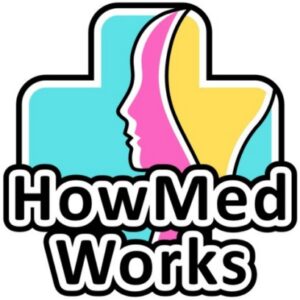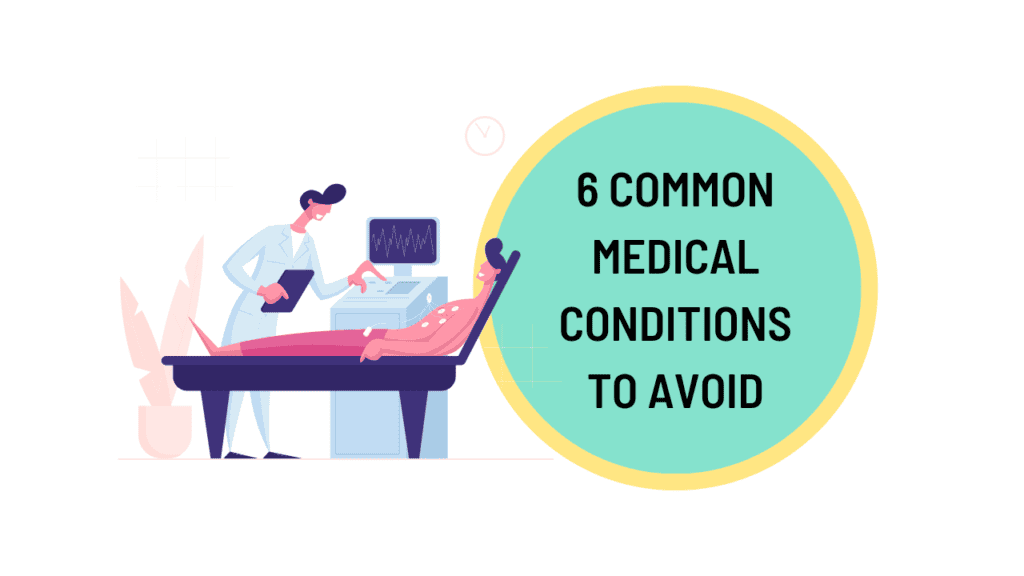
Medical conditions can range from minor to severe, and some can be life-threatening. In this article, we’ll go over the ten worst medical conditions to have, based on factors such as the severity of the condition, the potential complications, and the likelihood of death.
These conditions can be difficult to treat and can have a significant impact on an individual’s quality of life. It’s important to be aware of these conditions and to take steps to prevent or manage them, if possible.
Table of Contents
6 Worst Common Medical Conditions
Before we dive into the details, first take a look at this list of the six worst common medical conditions:
- Cancer
- Heart disease
- Stroke
- Alzheimer’s disease
- Diabetes
- Kidney failure
In the remainder of this article, I’ll go over the conditions, how they’re treated, and the steps that you can take to prevent getting them.
Keep in mind as you’re reading that there’s no method of guaranteeing that you will not develop any of these conditions, as they are complex and can occur for a variety of reasons (i.e. genetics, lifestyle, age, etc.). However, there are measures that you can take that have the potential to significantly reduce your risk.
1. Heart Disease
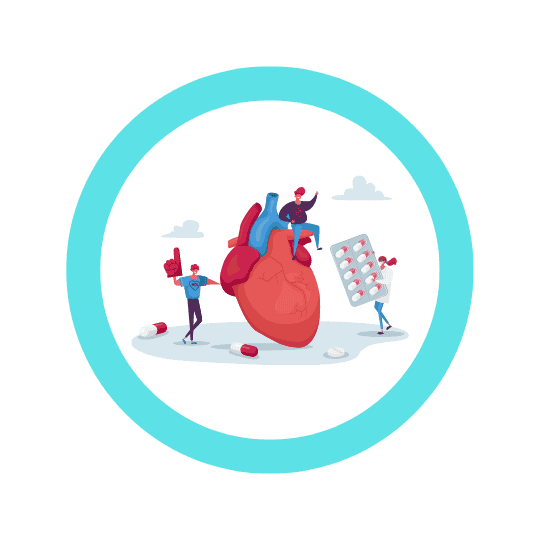
Condition
Heart disease, or cardiovascular disease (CVD), refers to a range of conditions that affect the heart and blood vessels and is the leading cause of death in the United States. The most common types of heart disease include coronary artery disease, heart failure, and arrhythmia. Symptoms of heart disease include chest pain, shortness of breath, and fatigue.
Treatment
Some common treatments for heart disease include medications, lifestyle changes, and surgical procedures. Medications such as beta blockers, ACE inhibitors, and diuretics can help to control symptoms and reduce the risk of complications.
In some cases, surgical procedures such as coronary artery bypass surgery or angioplasty may be necessary to treat heart disease. It’s important to work with your doctor to determine the best treatment plan for your specific condition.
Prevention
Heart disease prevention includes:
- Not smoking or using tobacco products
- Limiting alcohol consumption
- Eating a healthy diet that is rich in fruits, vegetables, and whole grains, and low in processed and red meats
- Maintaining a healthy weight
- Exercising regularly
- Managing chronic conditions, such as diabetes and high blood pressure
- Getting regular check-ups and screenings, as recommended by your healthcare provider
2. Stroke

Condition
A stroke is a medical emergency that occurs when blood flow to the brain is disrupted. This can be caused by a blood clot blocking an artery or by a blood vessel rupturing. Symptoms of a stroke may include weakness, numbness, difficulty speaking or understanding speech, and vision problems.
Important Information: A stroke is a very serious and potentially life-threatening condition. It can cause permanent brain damage, disabilities, and even death. According to data from the National Institutes of Health (NIH)
, 10 to 20 percent of stroke cases are fatal.
The risk of death from a stroke depends on several factors, including the type of stroke, the severity of the stroke, and the overall health of the individual. In general, the risk of death from a stroke is higher for people who have had previous strokes, who have other underlying medical conditions, or who are older.
Treatment
Treatment for stroke may include medications to dissolve the blood clot and surgery to remove the clot or repair the damaged blood vessel.
Prevention
Stroke prevention includes:
- Not smoking or using tobacco products
- Limiting alcohol consumption
- Eating a healthy diet that is rich in fruits, vegetables, and whole grains, and low in processed and red meats
- Maintaining a healthy weight
- Exercising regularly
- Managing chronic conditions, such as diabetes and high blood pressure
- Getting regular check-ups and screenings, as recommended by your healthcare provider
- Taking steps to prevent blood clots, such as avoiding long periods of sitting or standing, and avoiding tight clothing or accessories that can restrict blood flow
3. Cancer
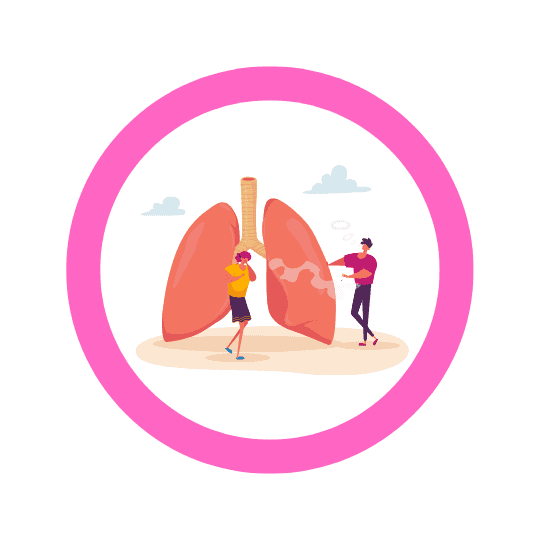
Condition
Cancer is a group of diseases that occur when abnormal cells in the body divide and grow uncontrollably. There are many different types of cancer, and they can affect any part of the body. The symptoms of cancer can vary depending on the type and location of the cancer, but they may include fatigue, weight loss, pain, and changes in bowel or bladder habits.
Treatment
Cancer can be treated with a combination of surgery, chemotherapy, radiation, and other treatments, but it is often difficult to cure and can be life-threatening.
Prevention
Cancer prevention includes:
- Not smoking or using tobacco products
- Limiting alcohol consumption
- Eating a healthy diet that is rich in fruits, vegetables, and whole grains, and low in processed and red meats
- Maintaining a healthy weight
- Exercising regularly
- Protecting your skin from excessive sun exposure by using sunscreen and avoiding prolonged periods of time in the sun
- Getting regular cancer screening tests, as recommended by your healthcare provider
4. Alzheimer’s Disease
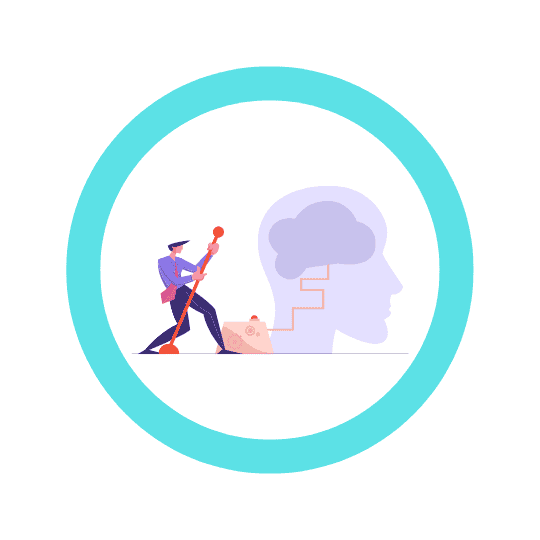
Condition
Alzheimer’s disease is the most common type of dementia. It causes problems with memory, thinking, and behavior and is a progressive disease, meaning that it gets worse over time. Symptoms of Alzheimer’s disease may include memory loss, difficulty with language and communication, and changes in mood and behavior.
Treatment
There is no cure for Alzheimer’s disease, and it is ultimately fatal. Treatment for Alzheimer’s disease may include medications to slow the progression of the disease and support for the patient and their caregivers.
Prevention
Alzheimer’s prevention includes:
- Getting regular check-ups and screenings, as recommended by your healthcare provider
- Engaging in mentally stimulating activities, such as reading, writing, or completing puzzles, to keep the brain active and healthy
5. Diabetes

Condition
Diabetes is a chronic disease that occurs when the body does not produce or properly use insulin – a hormone that regulates blood sugar levels. Increased thirst, hunger, and urination, as well as weight loss and fatigue, are some of the symptoms of diabetes.
Additional Information: There are two main types of diabetes: type 1 and type 2. Type 1 diabetes is caused by an autoimmune attack on the pancreas, while type 2 diabetes is caused by a combination of factors, including insulin resistance and poor diet.
Treatment
Diabetes can be treated with medications, insulin injections, and lifestyle changes. Lifestyle changes may include eating a healthy diet and getting regular exercise. Medication can include oral diabetes medications or insulin injections. Insulin therapy may be necessary for some people with diabetes, especially those with type 1 diabetes.
Prevention
Diabetes prevention includes:
- Eating a healthy diet that is rich in fruits, vegetables, and whole grains, and low in processed and red meats
- Exercising regularly
- Maintaining a healthy weight
- Not smoking or using tobacco products
- Limiting alcohol consumption
- Monitoring your blood sugar levels and taking steps to keep them within a healthy range
- Getting regular check-ups and screenings, as recommended by your healthcare provider
6. Chronic Kidney Disease (CKD)

Condition
Chronic kidney disease (CKD), also known as kidney or renal failure, is a condition in which the kidneys are no longer able to function properly. The kidneys are responsible for filtering waste products from the blood and removing them from the body in the form of urine. When the kidneys fail, waste products and excess fluids can build up in the body, which can be harmful.
Additional Information: Kidney failure can be acute, meaning that it develops quickly, or chronic, which means that it develops slowly over time. Acute kidney failure is often reversible, but chronic kidney failure is usually permanent and can be life-threatening.
Treatment
Treatment for kidney failure may include dialysis (a process that uses a machine to filter waste products from the blood) or a kidney transplant (surgically implanting a healthy kidney from a donor). There are no medications that treat CKD, specifically. However, there are many medications available that can help treat causes and complications of the disease.
that treat CKD, specifically. However, there are many medications available that can help treat causes and complications of the disease.
Prevention
Kidney disease prevention includes:
- Eating a healthy diet that is low in salt and processed foods
- Exercising regularly
- Maintaining a healthy weight
- Not smoking or using tobacco products
- Limiting alcohol consumption
- Managing chronic conditions, such as diabetes and high blood pressure
- Getting regular check-ups and screenings, as recommended by your healthcare provider
Conclusion
That wraps it up for this article! Now that you’re aware of these common medical conditions, you can be more proactive about your health.
I know that you’re probably tired of hearing about good diet and exercise, but they really are the best things that you can do in terms of disease prevention and overall well-being. It’s much better to avoid a disease than have to treat it. Remember, preventative care is the most urgent. 😉
See you in my next article! As always, stay healthy and keep learning.
